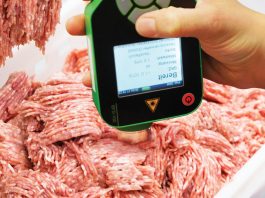The Food Standards Agency’s Director of Openness, Data and Digital, Julie Pierce, discusses the use of blockchain in the food industry and the impact it can have on consumers and businesses.
The Food Standards Agency (FSA) is responsible for food safety and food hygiene in England, Wales and Northern Ireland. It works with local authorities to enforce food safety regulations and its staff work in meat plants to check the standards are being met. Moreover, the agency uses science, evidence and information both to tackle the challenges of today, and to identify and contribute to addressing emerging risks for the future.
The Innovation Platform speaks to Director of Openness, Data and Digital at FSA, Julie Pierce, about how blockchain can be incorporated into the food sector, and the benefits that come alongside this.
What is Blockchain and why is it useful in the food sector?
A blockchain is a distributed (rather than a traditionally centralised) database that collates records and puts them in one block – similar to putting records on paper. Each block is then ‘chained’ to the next block with an encrypted signature. The process allows the blockchains to be used like a ledger so they can be shared and checked by anyone with the appropriate permission to do so.
Using blockchain in the food chain has the potential to improve traceability of the supply chain, minimise tampering of data, remove duplication in data entry and ensure the process is automated where feasible through the use of smart contracts. All of this contributes to surfacing information across the participants in a supply chain which could inform greater visibility of risks and handling of process such as product recalls and inventory management.
While blockchain is an emerging technology, we see that the real value accrues from cross-organisation collaboration. This allows for greater visibility across the supply chain beyond the one up and one down. It could also improve improvements in data quality as errors and inconsistent data is easier to spot.
What are the benefits?
Like most technologies, blockchain can be an enabler. Trust in blockchains should be considered on a case by case basis. The decision should go back to first principles as how you would take any decision on any new system development driven by factors such as the use of standards, understanding of user needs and interoperability.
There are some features of blockchains that could potentially enhance trust such as the immutability feature, which makes it harder to manipulate transactions. This uses the shared view of the group to police the ecosystem and could be particularly valuable to multi party (e.g. Government, Businesses, farmers, hauliers etc.) ecosystems such as the food supply chain.
What are the potential impacts?
The use of blockchain in the global food industry can have impacts on the way data and information is used across the supply chain to define trust. The definition of trust is an interesting area as it requires collaboration across the supply chain to define trust and how it will be delivered. It also requires a paradigm shift as operating in an ecosystem of participants forces us to think beyond organisational boundaries on how we can collectively develop an operating model that is sustainable and possibly facilitated by a neutral party.
There is also an implicit point on trust in blockchain as a solution. This isn’t helped by blockchains being synonymous to cryptocurrencies, such as Bitcoin. This means that its application in other sectors is viewed with a degree of scepticism. It is also a relatively new and emerging technology without widely accepted standards. The very nature of blockchain’s decentralised nature which is meant to enhance trust could make participants nervous as there is not a single centralised authority. To build trust any blockchain deployment needs to pay careful attention to a multitude of factors including what data is included ‘on chain’ vs. ‘off chain’, access rights, design of the underlying system and the quality of the data and creating a level playing field for participants.
Has the FSA trialled any Blockchain projects in the food sector?
The FSA has completed two pilots of the technology. We were trying to establish whether the use of blockchain could help us answer the following questions:
- Operations: Could blockchain deliver greater confidence in the data, speedier/better management of recalls, reducing food waste, taking out system inefficiency,
- Consumers: Could blockchain improve assurance,
- Regulation: Could blockchain result in better data in a recall, greater confidence in the food supply chain,
- Role of the regulator: What should our role as a regulator be (such as standards setter, governance provider, or convener etc.).
The first pilot was deployed on cattle traceability on an area known as ‘Collection and Communication of Inspection Results’ (CCIR). This is a statutory process in which the FSA has a legal obligation to collect and share data relevant to their livestock with food producer. This pilot was delivered in conjunction with food businesses. Moreover, we have also completed a second pilot on Pork Export Health Certification with food businesses.
Both pilots have demonstrated the opportunities for stakeholders across the supply chain to use data to improve traceability, minimise avoidable work and identify ways to improve existing process, all of which would allow official veterinarians more time to focus on other issues. We have also been able to test data quality, data standards and take up across the industry. The pilots have also highlighted the importance of having a governance approach which is centred around trust and standards.
The tech development is currently paused to enable us to work with industry and other government departments to identify principles and options for how we create a multi-party ecosystem. This work builds on the concept of Data Trust which we are trialling through a couple of small case studies. Our objective is to identify repeatable principles and patterns for governance that can facilitate multi party collaboration in an ecosystem. The initial phase of this work is likely to conclude in April 2020 and the findings will inform the next stage of development.
What is the future of blockchain and the food and drink industry?
It is difficult to say with any degree of certainty. There are a growing number of initiatives in the use of blockchain in food and the beverage industry across the globe. The learnings coming out of these pieces of work are invaluable in themselves and are highlighting the importance of adopting standards, focusing on data quality and data governance. It is also highlighting wider questions around governance model, the meaning and value of trust. Collaboration across industry players will enable tackling some of these more difficult challenges.
There are also wider questions on how should blockchains exist together and with legacy systems. What does an ecosystem of blockchains look like?
The potential for blockchain in the food and drink industry is large, but there are many things to be resolved for it to truly deliver on that promise. Moreover, many of those developments may well happen elsewhere, for example, in other industries, or by the innovative companies themselves. The food and drink industry might wish to consider whether it wants to play an active role in defining the future of blockchain, or maybe leave others to address the technology and it to address topics such as the use of standards, principles for interoperability and improving assurance and traceability.
Please note, this article will also appear in the first edition of our new quarterly publication. Subscribe to our updates for free here.









